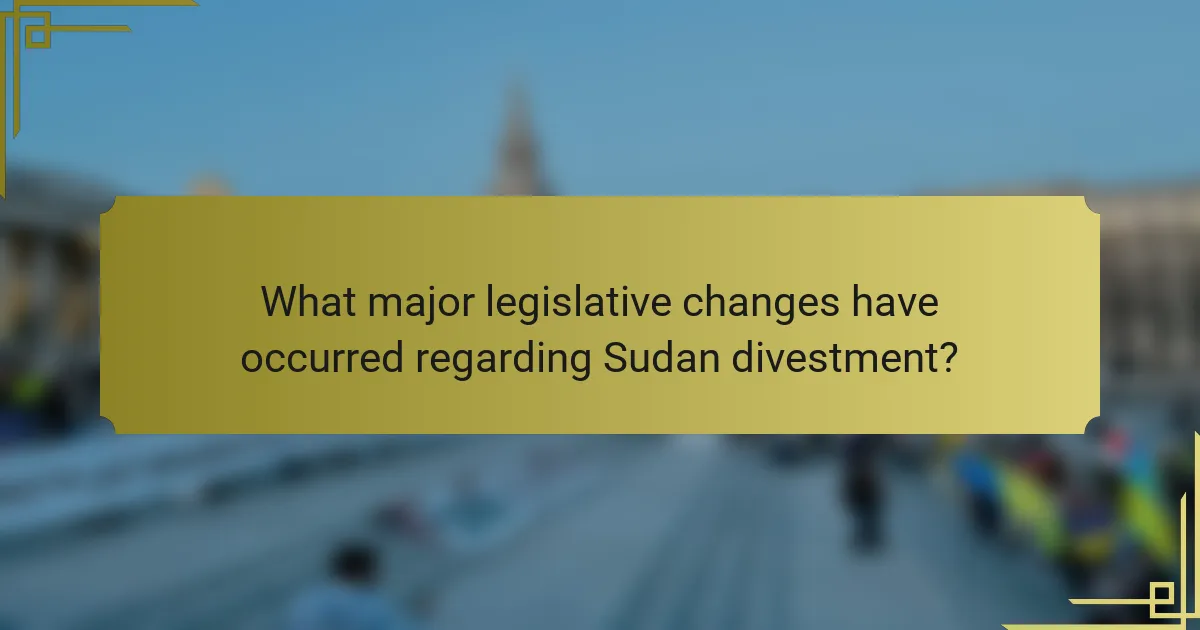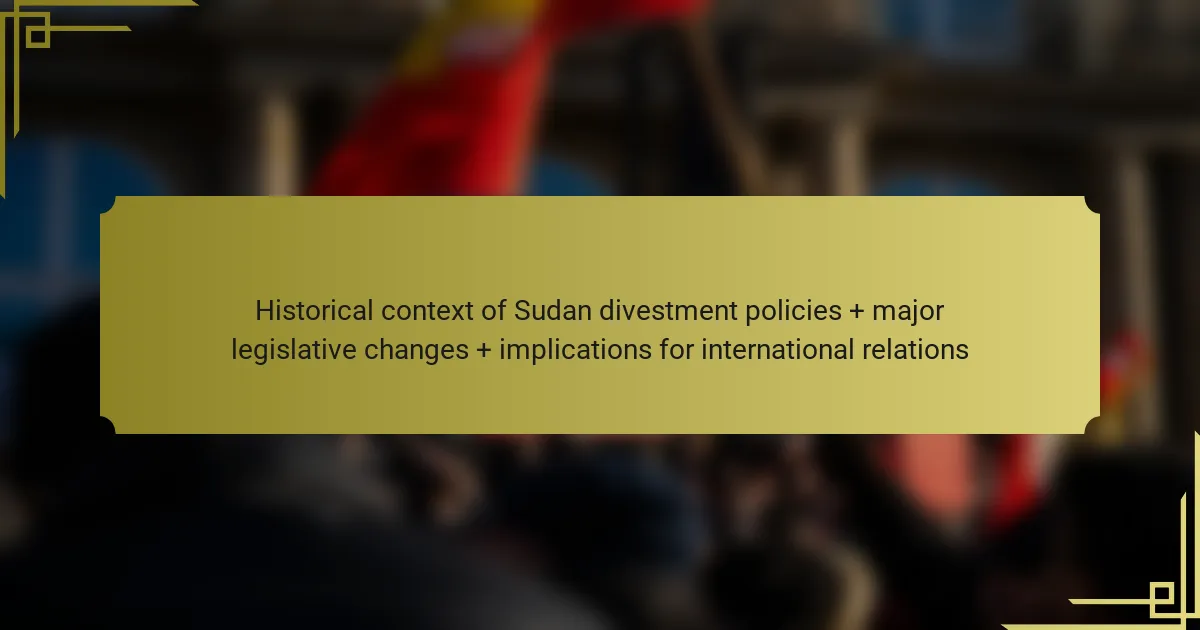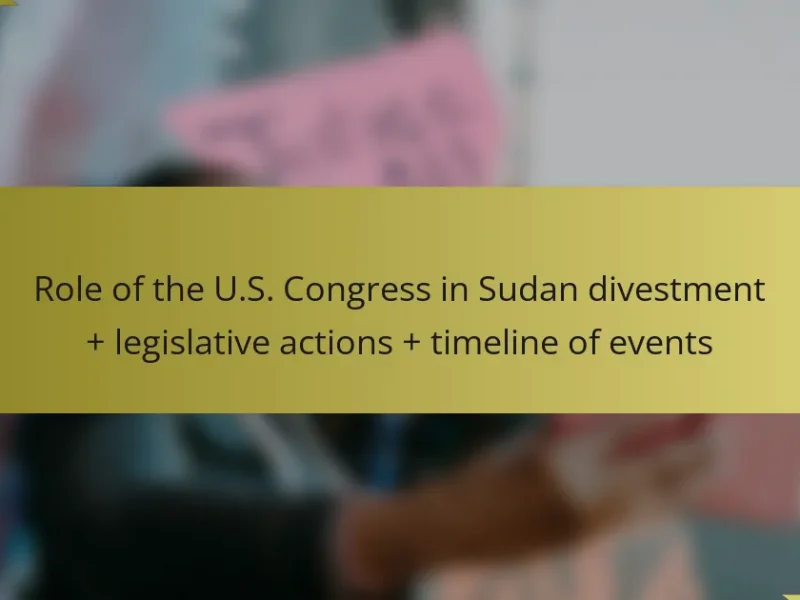Sudan divestment policies emerged as a response to the humanitarian crises and conflicts in Sudan, particularly the Darfur conflict that began in 2003. These policies aimed to pressure the Sudanese government to end human rights abuses and promote peace through economic means. Key legislative changes, including the Darfur Peace and Accountability Act of 2006 and the Sudan Accountability and Divestment Act of 2007, encouraged states and institutions to divest from companies operating in Sudan. The implications of these divestment policies have significantly influenced international relations, affecting diplomatic and economic engagements while reshaping perceptions of Sudan’s governance and humanitarian situation.

What are the historical context and origins of Sudan divestment policies?
Sudan divestment policies originated in response to the humanitarian crises and conflicts in Sudan, particularly the Darfur conflict that began in 2003. These policies were aimed at pressuring the Sudanese government to cease human rights abuses and promote peace. In the mid-2000s, activists and organizations highlighted the atrocities occurring in Darfur, leading to widespread advocacy for divestment from companies operating in Sudan.
The divestment movement gained traction in 2006 when the U.S. Congress passed the Darfur Peace and Accountability Act. This act encouraged states and institutions to divest from companies doing business with the Sudanese government. As a result, numerous states and universities adopted divestment policies, significantly impacting foreign investment in Sudan.
By 2010, the divestment movement had influenced international relations, as countries and corporations reassessed their ties with Sudan. The policies aimed to leverage economic pressure to achieve political change, reflecting a broader trend of using divestment as a tool for social justice.
How did the political landscape in Sudan influence divestment policies?
The political landscape in Sudan significantly influenced divestment policies through ongoing conflict and governmental instability. The Sudanese Civil War and the Darfur conflict prompted international condemnation and economic sanctions. These conflicts led to heightened awareness of human rights violations, driving investors to withdraw from Sudanese markets. Additionally, the U.S. government implemented the Sudan Accountability and Divestment Act in 2007. This legislation encouraged states and institutions to divest from companies operating in Sudan. The political situation also affected foreign relations, as countries aligned their policies with human rights considerations. Consequently, divestment became a tool for expressing disapproval of the Sudanese government’s actions.
What key events shaped the early divestment movements in Sudan?
The early divestment movements in Sudan were shaped by several key events. The Sudanese Civil War, starting in 1983, drew international attention to human rights abuses. The 1993 designation of Sudan as a state sponsor of terrorism by the U.S. government further fueled divestment efforts. In 2000, the Sudanese government’s actions in Darfur led to widespread condemnation. The enactment of the Sudan Accountability and Divestment Act in 2007 enabled states to divest from companies operating in Sudan. These events collectively galvanized public and institutional pressure for divestment. The movements aimed to leverage economic sanctions to influence Sudan’s policies and improve human rights conditions.
How have international responses affected Sudan’s divestment policies?
International responses have significantly impacted Sudan’s divestment policies. Global pressure and economic sanctions prompted Sudan to reevaluate its investment strategies. Key international actors, including the United States and the European Union, imposed restrictions due to human rights violations. These actions led to a decline in foreign investment and increased isolation. Consequently, Sudan shifted its policies to attract international investors. The government implemented reforms to improve its image and comply with international standards. This included legal changes aimed at fostering a more business-friendly environment. As a result, Sudan’s divestment policies became more aligned with global expectations, facilitating potential economic recovery.
What role did human rights concerns play in the development of divestment policies?
Human rights concerns significantly influenced the development of divestment policies. Activism against human rights violations, particularly in Sudan, catalyzed these policies. In the early 2000s, reports of genocide in Darfur prompted widespread public outcry. This led to organizations advocating for divestment from companies operating in Sudan. Legislative measures were introduced, such as the Sudan Accountability and Divestment Act of 2007. These laws encouraged states and institutions to withdraw investments from entities linked to human rights abuses. The alignment of divestment with human rights advocacy strengthened its effectiveness. This connection highlighted the moral obligation to respond to atrocities through economic means.
What specific human rights issues prompted divestment actions against Sudan?
Divestment actions against Sudan were primarily prompted by human rights violations during the Darfur conflict. The Sudanese government was accused of committing genocide against ethnic groups, including the Fur, Masalit, and Zaghawa. Reports documented widespread killings, rapes, and displacement of civilians. The United Nations estimated that hundreds of thousands of people died as a result of violence and related causes. Additionally, the Sudanese government employed militias known as Janjaweed to carry out attacks on civilian populations. These actions led to international condemnation and calls for divestment from companies operating in Sudan. In response, various states and organizations initiated divestment strategies to pressure the Sudanese government to cease its human rights abuses.
How did advocacy groups influence public perception and policy changes?
Advocacy groups significantly influenced public perception and policy changes regarding Sudan divestment. They utilized grassroots campaigns to raise awareness about human rights abuses in Sudan. These campaigns mobilized public support and generated media attention. Advocacy groups also engaged in lobbying efforts targeting policymakers. Their efforts led to the introduction of divestment legislation in various states. For example, California and New York enacted divestment laws in response to grassroots pressure. Additionally, reports by organizations like Human Rights Watch provided crucial evidence of the situation in Sudan. This combination of public engagement and documented evidence shaped legislative agendas. Consequently, advocacy groups played a pivotal role in altering both public opinion and policy frameworks related to Sudan.

What major legislative changes have occurred regarding Sudan divestment?
Major legislative changes regarding Sudan divestment include the passage of the Sudan Accountability and Divestment Act in 2007. This act mandated that U.S. states and institutions divest from companies doing business in Sudan. It aimed to pressure the Sudanese government to end human rights abuses, particularly in Darfur. Additionally, in 2012, the U.S. lifted some sanctions on Sudan, which altered the divestment landscape. In 2020, Congress passed the Sudan Peace Act, further influencing divestment policies by promoting peace and stability in the region. These legislative changes have significant implications for international relations, as they reflect U.S. foreign policy priorities and humanitarian concerns.
What are the key legislative acts related to Sudan divestment?
The key legislative acts related to Sudan divestment include the Sudan Divestment Act of 2007 and the Comprehensive Peace in Sudan Act of 2004. The Sudan Divestment Act prohibits U.S. investment in companies that support the Sudanese government. It aims to pressure the Sudanese regime to cease human rights abuses, particularly in Darfur. The Comprehensive Peace in Sudan Act supports peace efforts and humanitarian aid in Sudan. These acts reflect the international community’s response to Sudan’s actions and influence foreign relations.
How have U.S. sanctions impacted divestment policies over time?
U.S. sanctions have significantly influenced divestment policies over time. Initially, sanctions imposed in the 1990s targeted Sudan due to human rights violations and terrorism concerns. These sanctions prompted many U.S. investors and institutions to divest from Sudanese assets. In 2007, the Sudan Accountability and Divestment Act encouraged states and investors to withdraw from companies operating in Sudan. This act marked a shift toward formalized divestment policies in response to U.S. sanctions. Over time, increased awareness of Sudan’s humanitarian crises further reinforced divestment movements. By 2017, the U.S. lifted some sanctions, leading to a reevaluation of divestment strategies. However, many organizations continued to advocate for responsible investment practices in light of ongoing concerns. Thus, U.S. sanctions have consistently shaped the landscape of divestment policies regarding Sudan.
What changes occurred in international legislation regarding Sudan?
International legislation regarding Sudan has seen significant changes in recent years. The United Nations imposed sanctions on Sudan in 2005 due to human rights violations. In 2017, the U.S. lifted some sanctions, recognizing progress in peace efforts. In 2020, the U.S. removed Sudan from its list of state sponsors of terrorism. This removal facilitated Sudan’s access to international financial markets. Additionally, the European Union has adjusted its sanctions framework to support Sudan’s transition to democracy. These legislative changes reflect a shift towards engagement rather than isolation.
What are the implications of these legislative changes for businesses and investors?
The legislative changes regarding Sudan divestment policies create significant implications for businesses and investors. These changes may lead to increased market access for foreign investors. Enhanced regulatory clarity can attract investment by reducing risks associated with compliance. Businesses may benefit from improved trade relations as sanctions are lifted. Increased economic stability in Sudan can foster a more favorable investment climate. However, companies must remain vigilant about ongoing human rights concerns. Investors may need to conduct thorough due diligence to navigate potential risks. The overall effect could be a shift in foreign investment patterns, favoring sectors like infrastructure and energy.
How have divestment policies affected foreign investment in Sudan?
Divestment policies have significantly reduced foreign investment in Sudan. These policies were implemented mainly due to concerns over human rights violations and conflicts within the country. As a result, many foreign companies withdrew their investments. For instance, the U.S. imposed sanctions that restricted American businesses from engaging with Sudan. This led to a decline in foreign direct investment, which dropped from $2.1 billion in 2010 to around $200 million in 2020. Consequently, Sudan’s economy faced challenges in attracting much-needed capital for development.
What strategies have companies adopted in response to legislative changes?
Companies have adopted various strategies in response to legislative changes, particularly regarding compliance and risk management. They have implemented enhanced compliance programs to ensure adherence to new regulations. This includes conducting regular audits and training employees on legal requirements. Companies have also engaged in lobbying efforts to influence future legislation. They often collaborate with industry groups to advocate for favorable regulatory conditions. Additionally, some firms have diversified their operations to mitigate risks associated with specific legislative changes. This strategy helps them adapt to varying regulatory environments across different regions. Finally, companies have increased transparency in their operations to build trust with stakeholders amid changing laws.

How do Sudan divestment policies impact international relations?
Sudan divestment policies significantly impact international relations by altering diplomatic and economic engagements. These policies often lead to sanctions and reduced foreign investments. As a result, countries may distance themselves from Sudan to comply with international norms. This distancing can create tensions between nations that support divestment and those that maintain relations with Sudan. Additionally, divestment policies can affect humanitarian aid flows and influence global perceptions of Sudan’s governance. For instance, the U.S. enacted the Sudan Accountability and Divestment Act in 2007, which encouraged state and local governments to divest from companies operating in Sudan. This legislation aimed to pressure the Sudanese government regarding human rights issues, thereby reshaping international diplomatic strategies.
What are the broader geopolitical implications of Sudan divestment policies?
Sudan divestment policies have significant geopolitical implications. These policies aim to withdraw investments from entities supporting the Sudanese government. This divestment can lead to increased economic isolation of Sudan. Economic isolation may weaken the Sudanese government’s stability. It can also pressure the government to change its human rights practices. Additionally, these policies may shift international alliances. Countries supporting divestment may strengthen ties with other nations opposing Sudan’s policies. The United States and European Union have historically influenced these changes. Their actions can lead to broader international sanctions. Countries with economic interests in Sudan may resist these divestment efforts. This resistance can create tensions in international relations. Overall, divestment policies impact both Sudan’s economy and its foreign relations.
How have divestment policies affected Sudan’s relationships with other nations?
Divestment policies have strained Sudan’s relationships with many nations. These policies often lead to economic isolation and reduced foreign investment. Countries like the United States implemented divestment in response to human rights abuses in Sudan. As a result, Sudan faced sanctions that limited its trade opportunities. This isolation hindered Sudan’s ability to engage with Western nations. Additionally, divestment affected Sudan’s partnerships with international organizations. The cumulative effect has been a significant reduction in diplomatic engagement. Therefore, divestment policies have had a lasting negative impact on Sudan’s international relations.
What role do multilateral organizations play in shaping international responses?
Multilateral organizations play a crucial role in shaping international responses by facilitating cooperation among countries. They provide a platform for dialogue and negotiation on global issues. Organizations like the United Nations and the African Union coordinate responses to crises. They help establish norms and standards that guide international behavior. For instance, multilateral sanctions against Sudan were coordinated through these organizations. Their collective actions can amplify pressure on governments to comply with international laws. Additionally, they mobilize resources for humanitarian assistance in response to crises. This collaborative framework is essential for addressing complex global challenges effectively.
What are the potential future trends regarding Sudan divestment and international relations?
Future trends regarding Sudan divestment and international relations indicate a shift towards increased international engagement. Countries may reconsider their divestment strategies in response to evolving political dynamics in Sudan. The recent peace agreements and transitional government may foster renewed interest from foreign investors. Additionally, international organizations could play a larger role in facilitating economic partnerships. Human rights considerations will likely influence investment decisions moving forward. The global push for sustainable and ethical investment practices may also impact future trends. As Sudan stabilizes, international relations may strengthen, leading to enhanced economic cooperation.
How might changes in Sudan’s domestic policies influence international perceptions?
Changes in Sudan’s domestic policies can significantly influence international perceptions. Positive reforms may enhance Sudan’s image as a stable and cooperative nation. This could lead to improved diplomatic relations and increased foreign investment. For instance, the easing of restrictions on civil liberties may be viewed favorably by Western nations. Conversely, regressive policies could result in negative perceptions and potential sanctions. Historical instances, such as the lifting of U.S. trade sanctions in 2017, demonstrated how policy shifts can reshape international relations. Therefore, the trajectory of Sudan’s domestic policies will likely impact its global standing and engagement with the international community.
What best practices can be adopted to navigate the complexities of divestment policies?
Adopting best practices to navigate the complexities of divestment policies involves thorough research and stakeholder engagement. Organizations should conduct comprehensive assessments of the legal and financial implications of divestment. This ensures compliance with existing laws and regulations. Engaging with stakeholders, including investors and community groups, fosters transparency and builds trust.
Additionally, developing a clear divestment strategy helps in aligning the organization’s goals with ethical considerations. Regularly reviewing and updating the divestment policy is crucial as it reflects changing circumstances and stakeholder expectations. Utilizing expert consultations can provide valuable insights into the potential impacts of divestment decisions.
Finally, monitoring the outcomes of divestment actions enables organizations to learn and adapt their strategies effectively. These practices are essential for managing the complexities associated with divestment policies.
The primary entity of this article is Sudan divestment policies, which emerged in response to humanitarian crises, particularly the Darfur conflict. The article outlines the historical context and origins of these policies, detailing key legislative changes such as the Sudan Accountability and Divestment Act of 2007 and their implications for international relations. It examines how human rights concerns and advocacy efforts have shaped divestment actions, influencing foreign investment and Sudan’s geopolitical standing. Additionally, the article discusses the evolving landscape of international responses and potential future trends regarding Sudan’s domestic policies and their impact on global perceptions.


